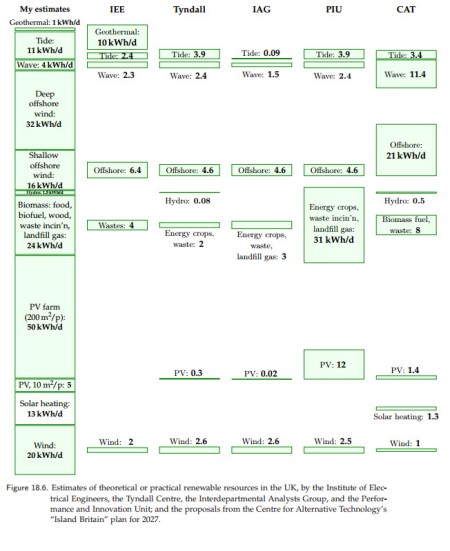We all know that modern civilisation is utterly dependent upon the consumption of non-renewable resources for its sustenance and growth. We burn oil, coal, and gas by the mega-tonne to provide the power for our factories, homes, and transport.
As a species we may be able to continue to do this for a while, but, by definition, it cannot continue forever… (for an understanding of exponential growth, and its challenges, see Dr. Bartlett’s talk “the greatest shortcoming of the human race is our inability to understand the exponential function“). Eventually, and soon on an historic time-frame, we will be forced to move away from fossil fuels, or face some dramatic, and in many cases terminal, revisions to our lifestyle.
Should renewables form the bulk of the future energy mix? Can they? What are the issues? What can be done?
This blog doesn’t concentrate particularly on carbon emissions and the Global Warming “debate” *, but it does strongly advocate the value of moving away from fossil fuels. The key problem is that the author doesn’t see any viable alternatives yet. This is worrying…
So, what can we say?
A pretty good primer for the Renewable Energy conversation is David MacKay’s 2009 publication “Sustainable Energy – without the hot air“. David MacKay is a professor of physics at Cambridge University, and a graduate of CalTech. MacKay is a serious advocate for sustainable energy, tackling the issues in a fact-based way. A key point of his book is that it breaks away from anecdote and adjectives into hard-numbers, arithmetic, and analysis, providing the tools for your own calculations. He has even made his book available to download, for free, in ,pdf format from his website – http://www.withouthotair.com/download.html.
However, I’d actually recommend shelling out your hard earned cash for the hardcopy. It’s a lot easier to flick back through the chapters and sections to re-visit interesting information or calculations. It’s a great book and available in paperback and hardback from Amazon UK (http://www.amazon.co.uk/exec/obidos/ASIN/0954452933/davidmackay0f-21).
One key angle of “without the hot air” is its use of accessible numbers. Energies are expressed in quantities per person, in kilowatt-hours (kWh), the same units that appear on household energy bills in the UK. Powers are expressed in kilowatt-hours per day (kWh/d). For instance:
- Driving a car 50km a day uses around 40kWh/d.
- Leaving a 40 Watt lightbulb on all day uses ~1kWh/d, which is co-incidentally about the power you could get from one human servant.
Defining the metric by per capita allows international comparisons to be made more easily, allowing comparisons such as the following:
- In the UK, waste incineration delivers around 7TWh (1 billion KWh) per year whilst in Denmark it delivers 10TWh.
- Looking at those numbers it seems that the UK is doing pretty well, with Denmark perhaps doing a bit better… but adjust them on a per-capita basis and it looks quite different.
- On a per capita basis Denmark gets 5kWh/d per person from waste incineration, whilst the UK creates just 0.3kWh/d per person. Quite a difference….
MacKay calculates that the averagely affluent UK resident consumes around 200kWh/d (vs. ~250-300kWh/d for a US resident). This is based on:
- An average consumption of 40kWh/d for car use, based on 50km distance per day, 12km per litre fuel efficiency, and 7kWh per litre of fuel (see the book for workings).
- An average consumption of 30kWh/d for flying, based on one international return trip per year of around 14,200km (London to Cape Town). The author of this blog made approximately 10 similar return trips last year, adding 300kWh/d to his personal energy consumption.!. MacKay calculates that a frequent flier would consume 60kWh/d at a minimum to qualify for silver status.
- An average consumption of 37kWh/d for hotwater, heating, and refrigeration (12kWh/d for hot water, 24kWh/d for heating, 1kWh/d for the fridge/freezer).
- An average consumption of 4kWh/d for lighting, assuming a household with 10 incadenscent lights and 10 low-energy lights
- An average consumption of 5kWh/d for gadgets, including computers, laser printers, televisions etc. It’s worth noting that whilst leaving chargers plugged in doesn’t cost much in terms of energy, a £20 DVD player can cost £10 a year in energy on standby mode… MacKay also includes figures for cloud servers at data centers, vacuum cleaners, and mowing the lawn.
- An average consumption of 15kWh/d for food, farming, and fertiliser, including farm machinery, feed of our meat producing farmed animals, and fertiliser.
- An average consumption of 4kWh/d for defence. Although it is noted that this is a necessarily crude calculation.
- The largest component of our energy consumption though is “stuff”. MacKay calculates an average consumption of 60kWh/D for the stuff we buy. This includes the energy associated with packaging, building houses, making cars (the largest component), freight of goods, retailer’s power consumption, and the energy to fabricate the goods to begin with. MacKay notes that each person in the UK imports around 2 tonnes of “stuff” every year, of which ~1.3 tonnes are manufactured like vehicles, machinery, white goods, or electronics.
MacKay notes that dividing the UK total primary power generation (fossil fuels, wind, and hydroelectricity) by the population is about 125kWh/d per person. (That 0.3kWh/d per person from waste incineration calculated at the start of this artcile looks really small-scale now…) Some of our energy “consumption” occurs overseas.
MacKay goes on to calculate the maximal reward that renewables could perhaps offer, again, subject to a lot of uncertainty. It’s not a pretty picture (but read MacKay’s book, he does make some suggestions on what can be done, and what it might cost in comparison to what we do today!):
It’s perhaps worth mentioning as an aside that MacKay uses a 1:1 conversion from electrical to chemical energy, whereas BP’s Statistical Review of World Energy uses 1:2.6 to account for conversion inefficiencies. Mackay calculates:
* For the record, the author of this blog observes that the increase in CO2 since the industrial revolution is a matter of record and that the basic physics of the “greenhouse” are simple and demonstrably proven… But, the author also notes that humans are pretty awful at accurately predicting the future, and predicting the impact of CO2 on the incredibly complex global climatic system is an almost impossible challenge. (Also, many people forget that climate change is entirely natural and normal, stasis is not, but it’s the rapid change and the anthropogenic nature of it that may be the problem; but that’s an aside)…
Many are working hard on the problem of global warming, with many detractors. However, the author goes on to assert that none of that matters – for various, very human, reasons (psychological biases such as future discounting and others) fear of global warming will simply not divert our economy from its current, arguably ravenous course. We need to grow or die, and it’s likely we will grow until we do die. As a species we will continue on this path, drilling & burning every pocket of oil, every trace of coal, every last mineral, until it is all gone. The author advocates switching to alternative fuels, be they renewables, nuclear fission, or even future fusion, to protect our way of life. Starvation of fuel, and peak energy, along with the associated strife, will likely kill us all far more quickly and effectively than global warming, and it’s likely to do so within the next century or two. Our absence would at least abate global increases in CO2…. The good news is that by switching fuels we not only save our civilisation, but our planet too… This scenario is stark, but we can do this, we just need the education to see the need to do so.
The only problem is that we need to develop and agree upon a workable, non-growth, sustainable economy, with a stable population, something that has never occurred in human history… the next few decades are perhaps the most crucial, the most polar in outcomes, of any human era…
… and that’s before you start thinking about the singularity…



